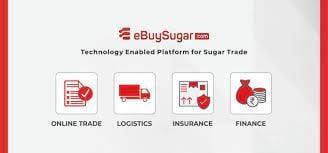Exploring the Sweet Success of Sugar Trading: Unveiling Opportunities and Strategies
Introduction
In the world of international trade and commerce, sugar holds a prominent position as one of the most widely traded commodities. Sugar trading involves the buying and selling of sugar in various forms, such as raw sugar, refined sugar, and specialized sugar products. This article aims to provide a comprehensive overview of sugar trading, highlighting its importance, market dynamics, and key factors that contribute to successful trading in this sector
The Significance of Sugar Trading
Sugar is a vital ingredient found in countless food and beverage products consumed globally It is not only used as a sweetener but also serves as a preservative, providing desirable characteristics to various food items. The demand for sugar remains consistently high, making it a lucrative industry for traders. Sugar trading plays a crucial role in ensuring the availability of sugar to consumers worldwide while allowing producers and suppliers to optimize their market reach.
Understanding the Sugar Market

Factors Influencing Sugar Prices
The sugar market is influenced by a multitude of factors that impact the supply and demand dynamics, thereby affecting the price fluctuations. Some key factors include:

Production and Consumption: Sugar is primarily produced in tropical regions, and fluctuations in crop yields due to weather conditions, disease outbreaks, or changes in agricultural practices can significantly impact prices. Similarly, changes in consumption patterns and population growth also affect the demand for sugar
Government Policies: Government interventions, such as import/export regulations, subsidies, and tariffs, can have a significant impact on the sugar market. These policies aim to protect domestic producers, stabilize prices, or address public health concerns related to sugar consumption.
Currency Exchange Rates: Since sugar is a globally traded commodity, fluctuations in currency exchange rates can impact its price. Currency devaluations or appreciations can affect the competitiveness of sugar-producing and consuming countries.
Energy Prices: The production of sugar involves significant energy inputs, primarily in the form of fuel for machinery and equipment. Changes in energy prices, especially oil prices, can influence the production costs of sugar and subsequently impact its market price.
Sugar Trading Mechanisms
Sugar trading occurs through various channels, including futures markets, spot markets, and over-the-counter (OTC) transactions.

Futures Markets: Futures contracts provide a standardized platform for buyers and sellers to trade sugar at a predetermined price and future date. These contracts allow market participants to hedge against price volatility and manage risks associated with their sugar-related business operations.
Spot Markets: Spot trading involves the immediate purchase or sale of sugar at the prevailing market price. Spot markets provide flexibility and agility to traders, enabling them to respond quickly to changing market conditions.
Over-the-Counter (OTC) Transactions: OTC transactions involve direct negotiations between buyers and sellers outside of organized exchanges. OTC trading allows for more customized agreements tailored to specific requirements, but it may involve higher counterparty risks.
Successful Sugar Trading Strategies
To thrive in the competitive sugar trading industry, traders need to adopt effective strategies and stay abreast of market trends. Here are some key considerations for successful sugar trading:
Comprehensive Market Analysis
Traders must conduct thorough market analysis to understand the current supply-demand dynamics, prevailing prices, and emerging trends. By studying historical data, tracking weather patterns, and analyzing global economic indicators, traders can make informed decisions and capitalize on market opportunities.
Risk Management
Given the inherent volatility in sugar prices, risk management plays a pivotal role in sugar trading. Traders can employ various risk mitigation techniques, such as hedging through futures contracts, diversifying their portfolios, and implementing robust risk management systems.

Supply Chain Optimization
Efficient supply chain management is critical for ensuring timely delivery and minimizing costs in sugar trading Traders need to establish strong relationships with reliable suppliers and transporters to ensure a smooth flow of sugar from production centers to the market. Implementing effective logistics strategies, including
inventory management and transportation optimization, can help traders gain a competitive edge.
Quality Control
Maintaining consistent quality is essential in sugar trading. Traders should closely monitor the quality of sugar throughout the supply chain, from sourcing to delivery Implementing quality control measures, such as laboratory testing, certification, and adherence to international standards, helps build trust with customers and ensures the satisfaction of end consumers.

Market Intelligence
Staying informed about market trends, trade policies, and regulatory changes is crucial for sugar traders. Access to accurate and timely market intelligence provides valuable insights into emerging opportunities, potential risks, and competitor analysis. Traders can leverage this information to make informed decisions and adjust their trading strategies accordingly
Building Relationships
Establishing strong relationships with key stakeholders in the sugar industry is essential for long-term success. This includes maintaining connections with sugar producers, processors, buyers, and industry associations. Collaborating with industry players can lead to mutually beneficial partnerships, access to new markets, and valuable market insights.

Sustainability and Ethical Considerations
 Sugar Trading
Sugar Market Place
Sugar Trading
Sugar Market Place
As sustainability and ethical practices gain prominence in the business world, sugar traders should prioritize environmental and social responsibility Embracing sustainable sourcing practices, supporting fair trade initiatives, and ensuring compliance with labor and environmental regulations contribute to a positive brand image and enhance market competitiveness.
Conclusion
Sugar trading is a dynamic and lucrative sector that requires a deep understanding of market dynamics, effective risk management strategies, and a commitment to quality and sustainability Successful sugar traders navigate the complexities of the market by conducting comprehensive market analysis, implementing robust risk management techniques, optimizing supply Dubai, and staying informed about market trends. By embracing these strategies and building strong relationships within the industry, sugar traders can position themselves for long-term success.
